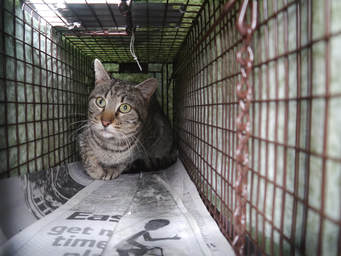 Alley Cat Rescue had a busy 2017! We hit the ground running and sterilized 1,433 cats last year alone. We were able to accomplish such a feat by continuing to offer our Cheap Fix clinic to the local community, while also training animal control officers in Roanoke, Virginia how to implement trap-neuter-return (TNR) and by performing TNR ourselves. The number of cats we sterilize per year has grown dramatically. From 895 cats in 2010, to over 1,400 cats this passed year … that’s a 60% increase! Moving forward our goal is to sterilize over 1,500 cats in 2018. ACR also works to promote sterilization through our May Spay Challenge, where participating veterinarians have already sterilized 35,000 cats across the globe. Why is promoting sterilization and TNR so important? Because they’re the most effective and humane methods of reducing cat overpopulation. Providing spay/neuter and TNR services stop the reproduction cycle in its tracks. When cats are left to breed, this results in high rates of euthanasia of healthy animals at shelters across the country, simply because shelters cannot care for the high number of cats and kittens being born each year. Currently, the ASPCA estimates that 860,000 cats are euthanized every year. It’s true that the number of cats euthanized per year has been decreasing, however, we still have a lot of work to do. No healthy cat should be euthanized simply for lack of resources or homes. Promoting sterilization and TNR is a large component of ACR’s mission of protecting all cats. You, too, can get involved in spay/neuter and help save cats’ lives! Watch ACR’s step by step guide on TNR and get out in the field yourself. Together we can assist cats and our communities. If there are no feral cats in your neighborhood, please consider donating to ACR so we can continue to help cats.
2 Comments
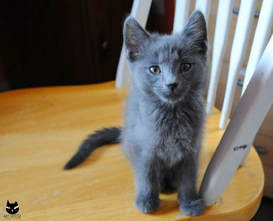 Kitten season is around the corner! This annual influx of kittens around this time of year follows the cats’ breeding cycle beginning in March in the Western Hemisphere. Although kitten season may sound like a cute time of year, kittens are one of the most vulnerable groups of cats for euthanasia at shelters. The high intake of kittens can decrease their chances of survival due to overcrowding. Over 1.4 million cats enter U.S. shelters each year, but sadly, 3 in 10 will not make it out alive. The good news is that you can help kittens and gain a new lovable companion! ACR is looking for foster parents to temporarily house kittens in their home. Fostering helps free up valuable space at ACR headquarters and helps kittens receive one-on-one attention and socialization, making them better candidates for adoption. Fostering is great for cat lovers who want the joy of having a kitten but cannot make the life-long commitment of having a permanent companion. ACR provides foster parents with training and resources to help them best care for kittens. In return, fosters receive the valuable and heartwarming experience of caring for and loving a kitten; plus, the satisfaction of knowing they truly are saving lives! Our current foster parents enjoy meeting so many amazing kittens, each with their own purrsonalities, and they’re rewarded by watching their kittens adopted into loving forever homes. If you’re interested in becoming a foster parent, please contact acr@saveacat.org to learn more about our program. 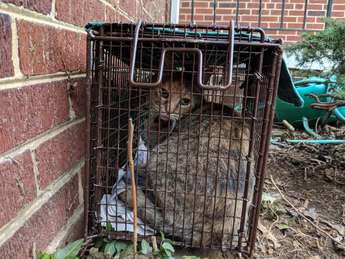 Great news for cats in Maryland this week! The Baltimore County Department of Animal Services is opening up its Southwest Area Park Swap Feral Cat Spay/Neuter Clinic services to recipients of Maryland’s Department of Agriculture spay/neuter grant. The state of Maryland runs a grant program that is “designed to the number of unwanted cats and dogs euthanized in shelters across the state.” The program works by providing grants to local governments and animal welfare organizations to promote and provide free spay/neuter services to companion animals and feral cats cared for by low income Maryland residents. This new clinic will be a great asset to local governments and animal welfare organizations as it provides a fully equipped surgical suite to accommodate high-volume/high-quality services, a holding and recovery facility specifically for feral cats and a loading space for easy loading and unloading of caged cats. Spaying and neutering cats is the most effective way to reduce cat overpopulation and reduce euthanasia at shelters. This clinic will help save countless cats’ lives and help make spay/neuter services accessible to everyone, regardless of income. The SWAP facility can be found at 3941 Klunk Drive, Brooklyn Maryland. Spay/neuter services will be free to groups working within Baltimore County and will be $40 a cat for groups outside of the county. People interested in receiving the free spay/neuter services are urged to contact the grant recipients directly. 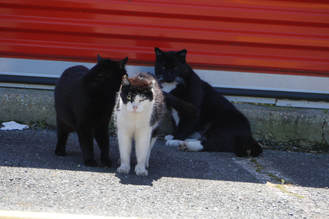 Proposed bans on the feeding of feral cats have come up time and time again as a potential solution to cat overpopulation. These bans incorrectly assume that if people stop feeding feral cats, they will simply leave the area and the problem will be over. This is not the case. Feeding bans are not only ineffective, but cruel. They suddenly cut off an expected source of food for cats and criminalize compassion. Alley Cat Rescue opposes feeding bans and is working towards ensuring more cities implement trap-neuter-return as a humane solution to cat overpopulation. Cats are scavengers and will search to find food. If a feeding ban is enacted, the cats often will stay in the area and find a new source of food. The cats will eat garbage, scraps or other animals which do not provide cats with the nutrients they need. Malnourished cats are more susceptible to diseases and parasites. Because feeding bans do not address reproduction at all, the malnourished cats will often give birth to sick kittens who will die at a young age. Feeding bans actually create more nuisance behaviors than they eliminate. The bans encourage cats to search through garbage, fails to spay/neuter cats and leads to the spread of diseases. Cats without a solid source of food will wander around towns more than cats who have an area where they know they will be fed at. The feeding bans also make trap-neuter-return (TNR) almost impossible because the cat caretakers cannot lure the cats to the traps with wet food. TNR ends these nuisance behaviors while also stopping reproduction. Cat caretakers are compassionate people who want to help cats in their area. Compassion should not be criminalized but encouraged. Without cat caretakers feeding and TNRing cats, many more cats would suffer. Further, the enforcement of feeding bans is very difficult and resource intensive. Areas that want to address cat overpopulation should instead implement TNR. If your town or city is considering a feeding ban please reach out to your government and tell them:
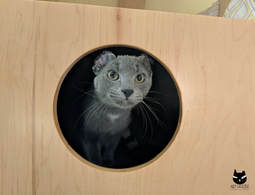 This week is National Justice for Animals Week, an important time to focus on one of the most vulnerable victims of abuse. It is vital that people take action to protect animals and give a voice to the voiceless. Many of our supporters have kept up to date on Hardy, a cat Alley Cat Rescue saved who had endured weeks of torture and mutilation. Although his recovery was inspiring, it was a difficult story for many to hear. ACR has been advocating for Hardy and cats who have endured similar abuses, to end this senseless violence. You too can help victims of animal cruelty by calling your representatives and urging them to take action on these important bills: Federal Laws:
State and Local Laws:
[1] Dog and Cat Meat Trade Prohibition Act. N.d. Retrieved from https://awionline.org/legislation/dog-and-cat-meat-trade-prohibition-act. [2] Sharp, M. (October 20, 2017). “It’s time to go cruelty-free.” Retrieved from http://m.humanesociety.org/news/magazines/2017/11-12/cruelty-free-they-are-worth-it.html. [3] United States Department of Agriculture. (2016). “Annual Report Animal Usage by Fiscal Year.” Retrieved from https://www.aphis.usda.gov/animal_welfare/downloads/reports/Annual-Report-Animal-Usage-by-FY2016.pdf. |
Details
AuthorAlley Cat Rescue is leading in the way in promoting humane and compassionate care for ALL cats. Archives
January 2024
Categories
All
|
 RSS Feed
RSS Feed